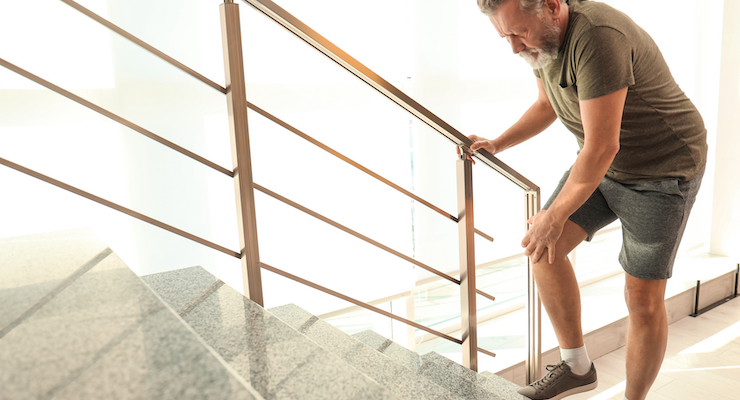08.04.21
A new study on a turmeric extract, marketed by the Mumbai, India-based brand Nutriventia as TurmXTRA 60N published in Clinical Pharmacology: Advances and Applications concluded that the ingredient was capable of reducing knee pain after workouts following exercise in a group of 96 healthy adults who experienced chronic knee pain following physical exertion.
“This study is pivotal since it showcases the benefits of a small dose of TurmXTRA 60N, that in healthy subjects and as more people become active, a supplement that helps preserve knee structure and function we feel will be highly sought-after,” Anand Godbole, vice president of Marketing and Strategy for Inventia, Nutriventia’s parent company, said.
Curcuminoids, the bioactive components found within turmeric, are known to exert potent antioxidant and inflammatory-modulating activity within the body when consumed in highly purified forms, and has been substantially evidenced to reduce concentrations of several pro-inflammatory factors.
The researchers in the present study recruited participants for a double-blind, placebo-controlled, clinical study in which the participants were evaluated based upon self-reported symptoms they experienced following physical exertion in terms of joint comfort, mobility, and performance. In addition to self-reported results, they also measured post-exertion performances on a 9-step stair climb test.
The participants reported significant and clinically-relevant results as early as 45 days of supplementation into the 90-day study period. The test parameters included various aspects of mobility in joints, as well as perception of pain. Significant improvements were also observed in the stair climb test compared to the placebo group.
“Chronic knee pain can adversely affect daily activities like climbing of the stairs even in non-arthritic adults, and this could be a psycho-physiological limiting factor that may lead to avoidance of routine daily activities,” the authors of the study said. “It is reported that chronic knee pain can predict the structural progression to osteoarthritis.”
Despite limited bioavailability at low doses, the turmeric extract used in the study was able to exert significant benefits toward joint function and pain in the participants in as little as three months. At lower efficacious doses, the formulation can also serve as an alternative to the higher-dose turmeric extract formulations which can have a better tolerability profile.
A previous pharmacokinetic study found that TurmXTRA 60N could have a bioavailability equivalent to ten-times the dosage of a standard turmeric extract, Nutriventia said, adding that it implies an equivalence in bioavailability between 250 mg of TurmXTRA 60N and 1575 mg of a standard turmeric extract with 95% curcuminoids.
“This study is pivotal since it showcases the benefits of a small dose of TurmXTRA 60N, that in healthy subjects and as more people become active, a supplement that helps preserve knee structure and function we feel will be highly sought-after,” Anand Godbole, vice president of Marketing and Strategy for Inventia, Nutriventia’s parent company, said.
Curcuminoids, the bioactive components found within turmeric, are known to exert potent antioxidant and inflammatory-modulating activity within the body when consumed in highly purified forms, and has been substantially evidenced to reduce concentrations of several pro-inflammatory factors.
The researchers in the present study recruited participants for a double-blind, placebo-controlled, clinical study in which the participants were evaluated based upon self-reported symptoms they experienced following physical exertion in terms of joint comfort, mobility, and performance. In addition to self-reported results, they also measured post-exertion performances on a 9-step stair climb test.
The participants reported significant and clinically-relevant results as early as 45 days of supplementation into the 90-day study period. The test parameters included various aspects of mobility in joints, as well as perception of pain. Significant improvements were also observed in the stair climb test compared to the placebo group.
“Chronic knee pain can adversely affect daily activities like climbing of the stairs even in non-arthritic adults, and this could be a psycho-physiological limiting factor that may lead to avoidance of routine daily activities,” the authors of the study said. “It is reported that chronic knee pain can predict the structural progression to osteoarthritis.”
Despite limited bioavailability at low doses, the turmeric extract used in the study was able to exert significant benefits toward joint function and pain in the participants in as little as three months. At lower efficacious doses, the formulation can also serve as an alternative to the higher-dose turmeric extract formulations which can have a better tolerability profile.
A previous pharmacokinetic study found that TurmXTRA 60N could have a bioavailability equivalent to ten-times the dosage of a standard turmeric extract, Nutriventia said, adding that it implies an equivalence in bioavailability between 250 mg of TurmXTRA 60N and 1575 mg of a standard turmeric extract with 95% curcuminoids.




























